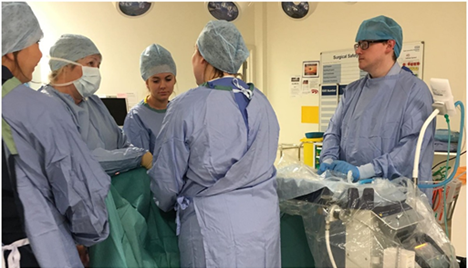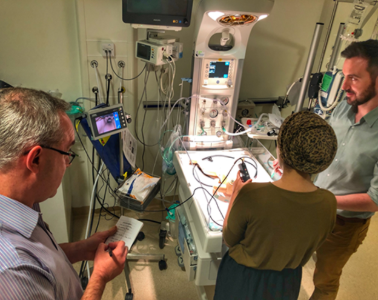The department has bi-weekly formal teaching sessions led by internal and external speakers (face to face or virtually), journal clubs led by trainees, audit and guidelines meetings. We have a strong culture of regular audits and QI projects, and trainees are encouraged to lead in guideline development. There are regular clinical governance and mortality meetings.

Simulation: The department has a strong interest in simulation teaching with simulation sessions led by consultants and nurse educators. There is also a focussed training session called the neonatal resuscitation interest group (N-RIG) led by three consultants, focusing on extreme preterm delivery and acute resuscitations.
Point of care ultrasound (POCUS): As many as six of the eight consultants perform echocardiography routinely and all are proficient with cranial ultrasound. Some of the consultants have trained in ultrasound guided central line insertion and lung ultrasound. We have put together a learning package for basic cranial ultrasound and neonatal echocardiography for trainees who are interested.

Difficult airway training: The unit has a videolaryngoscope and consultants who teach in difficult airway courses regionally and nationally.
Nursing education - Our fantastic nursing educators run intense Nursing update days which are a combination of didactic lectures, equipment training and simulations.
Research in the unit
Our department has a strong research culture and has been a recruiting centre for multi centre trials like Baby-OSCAR, PLANET -2 and more recently RECOVERY Trial for Covid. Our unit is also one of the few units in UK to have been site selected for the international trial on BPD- Footrpints.
Trainees are encouraged to undertake short projects, which could be retrospective or prospective, and teaching is provided on basic research methods and statistics.
Overseas training program:
We are the first neonatal unit to host overseas trainee in a neonatal MMed program in conjunction with the Edgehill university. This is an unique two year curriculum based program where trainees are selected through interview and have a balance of clinical experience at the unit and academic development through the university. For more details click here.
Publications
- Andrews E, Sur A. Is inhaled budesonide a useful adjunct for the prevention or management of bronchopulmonary dysplasia? Archives of Disease in Childhood. 2020 May;105(5):508-511. DOI: 10.1136/archdischild-2019-318762.
- Sur, A., Paria, A. Histogram analysis for bedside respiratory monitoring in not critically ill preterm neonates: a proposal for a new way to look at the monitoring data. Eur J Pediatr (2020). https://doi.org/10.1007/s00431-020-03732-2
-
Barton R, Broome C, Heyes V, Martindale L, Sivashankar S. Freestanding midwifery unit – the first year's experience Archives of Disease in Childhood - Fetal and Neonatal Edition 2012;97:A89-A90.
Posters in national conferences
- "Use of Volume guarantee ventilation for optimal PCO2 balance"- Sinha A, Soni NB, Sur A , Reason 2017- best trainee poster
- "Best Practices around preterm stabilisation- developing a care bundle approach"- Reason 2020, Sur A, Paria A, Shihab J, Cox A
- "Use of simulation to implement delayed cord clamping in preterm birth"- Northwest Perinatal and Pediatric Simulation conference, 2019. Shihab J, Sur A, Paria A, Cox A.
- "Parallel planning in twin pregnancy, antenatal counselling and implications at delivery"- Bend S, Porter D, Shihab J, European Neonatal Ethics conferecne, 2019.


